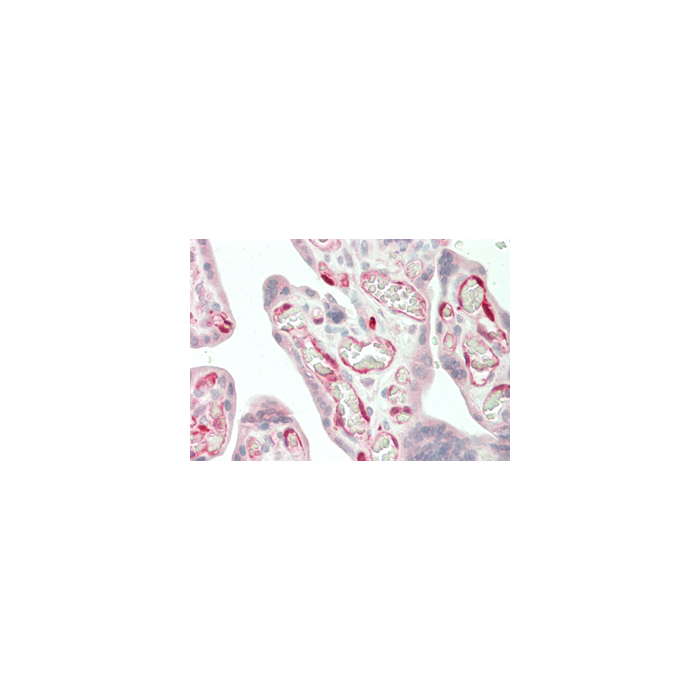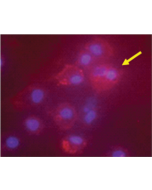Cookie Policy: This site uses cookies to improve your experience. You can find out more about our use of cookies in our Privacy Policy. By continuing to browse this site you agree to our use of cookies.
AdipoGen Life Sciences
anti-IDO1 (human), mAb (ID 177)

This antibody has been tested in immunohistochemistry, analyzed by an anatomic pathologist and validated for use in IHC applications against formalin-fixed, paraffin-embedded human tissues. The image shows the localization of the antibody as the precipitated red signal, with a hematoxylin purple nuclear counterstain.
1: Recombinant human IDO1 (His-tagged).
2: PHA-treated human peripheral blood lymphocyte lysate.
3: Con A-treated human peripheral blood lymphocyte lysate.
4: Human peripheral blood lymphocyte lysate.
| Product Details | |
|---|---|
| Synonyms | Indoleamine 2,3-dioxygenase 1; IDO; INDO |
| Product Type | Monoclonal Antibody |
| Properties | |
| Clone | ID 177 |
| Isotype | Mouse IgG1κ |
| Immunogen/Antigen | Recombinant human IDO1. |
| Application |
ELISA: (direct or indirect: 1:2'000-1:10'000) |
| Crossreactivity | Human |
| Specificity |
Recognizes human IDO1. Detects a band of ~45kDa by Western blot. Other species not tested. |
| Purity Detail | Protein G-affinity purified. |
| Concentration | 1mg/ml |
| Formulation | Liquid. 0.2μm-filtered solution in PBS, pH 7.4. Contains no preservatives. |
| Isotype Negative Control | |
| Accession Number | P14902 |
| Shipping and Handling | |
| Shipping | BLUE ICE |
| Short Term Storage | +4°C |
| Long Term Storage | -20°C |
| Handling Advice |
After opening, prepare aliquots and store at -20°C. Avoid freeze/thaw cycles. |
| Use/Stability | Stable for at least 1 year after receipt when stored at -20°C. |
| Documents | |
| MSDS |
 Download PDF Download PDF |
| Product Specification Sheet | |
| Datasheet |
 Download PDF Download PDF |
IDO1 is a heme enzyme that catalyzes the first and rate-limiting step in the main pathway of human tryptophan catabolism, the kynurenine pathway, causing depletion of tryptophan which can lead to halted growth of microbes as well as T cells. IDO1 is an immune checkpoint protein, thought to play a role in a variety of pathophysiological processes such as antimicrobial and antitumor defense, neuropathology, immunoregulation and antioxidant activity. Cancer cells are able to evade the immune system is by hijacking the checkpoint proteins. Increased IDO1 protein levels drive growth arrest and apoptosis of the effector T cells, a group of immune cells that mediate the immune system’s ability to destroy pathogens. By reducing the number of effector T cells, IDO1 overexpression prevents the immune system from effectively destroying cancer cells. IDO1 overexpression has been observed in a wide range of human cancers such as prostatic, colorectal, pancreatic, cervical, gastric, ovarian, head or lung cancer. Physiological IDO1 activity has been implicated in T cell tolerance to tumors, dysfunctional selftolerance in non-obese diabetic (NOD) mice, and as a protective negative regulator in autoimmune disorders.






